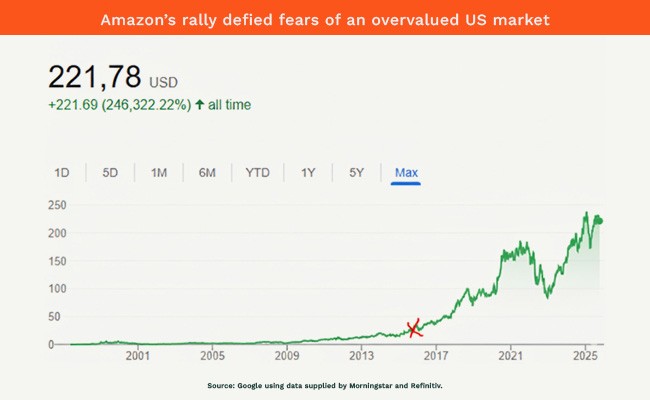Peter Lynch was one of the greatest investors of all time. As manager of the Magellan Fund at Fidelity from 1977 to 1990, he achieved an average annual return of more than 29%, making it the world’s best-performing mutual fund. At its peak, one in every 100 Americans had money in it.
Even Warren Buffett drew on his wisdom. The famous line, “selling your winners and holding your losers is like cutting your flowers and watering your weeds” – often attributed to Buffett as another way of saying selling winners too early and holding onto losers – was in fact coined by Lynch. Buffett reportedly phoned him to ask permission to use it at a shareholder meeting, and that’s how the confusion began.
In a recent interview, Lynch recalled that Buffett bought Apple eight years after he did and still made five times his money. Apple remains Berkshire Hathaway’s largest holding.
Lynch was known for holding onto his winners for decades. The question is: what does that mean for investors today?
The large-cap tech companies dominating global markets have been doing so not just for the past decade but since 2008 – 17 years of relentless growth.
I remember a 2015 Bloomberg headline calling Amazon “the most overpriced stock in America”. It was true: Amazon was expensive by any traditional valuation metric. That same year, it more than doubled, returning 113%.
The stock looked expensive. It had just doubled. Headlines screamed “bubble”. What would you have done?
Look at Amazon’s share price since then – 2015 was only the beginning. The moral? Selling your winners and buying more of your losers is exactly what Lynch warned against.

The US market has looked expensive for more than a decade. In 2015, the S&P 500’s valuation metrics were already above long-term averages. They still are – but nowhere near the excesses of the dot-com bubble or the “Nifty 50” era of the early 1970s, when investors paid any price for “blue-chip” growth stocks.
The index is up 14% this year, yet in dollar terms it has trailed Europe, emerging markets and even South Africa. The difference isn’t about stronger businesses abroad; it’s about the dollar easing from its 2022 highs as US rates normalise.
Fund managers have been quick to claim credit for being underweight the US and overweight Europe, or “undervalued” regions that have benefited from this. But if they made that call purely on valuation, they’ve likely been underweight for a decade – and missed one of the greatest bull markets in history.
Today’s mega-cap US tech firms generate more than $50bn in quarterly revenue, boast margins above 30%, grow at double digits, and hold vast cash reserves. They are, by any measure, among the highest-quality businesses ever built – and the market prices them accordingly.
Innovation vs imitation
There’s an old saying: America innovates, China imitates, and Europe legislates.
Think of truly innovative European firms. Beyond ASML, the chip-lithography leader, and a handful of luxury giants like LVMH, how many come to mind?
While a weaker dollar has buoyed European markets, this recent outperformance is essentially a currency story, not a sign of superior innovation or profitability. The US, for all its perceived overvaluation, remains the centre of global enterprise and invention.
Consensus is usually wrong
Lynch also said investors have lost far more money preparing for corrections than in the corrections themselves.
If you’ve stayed underweight US stocks because they looked expensive, or sat on cash waiting for that crash everyone keeps predicting, you’ve fallen into that trap.
The consensus view for the past decade has been to underweight the most dominant, innovative companies while doubling down on legacy businesses.
Money managers have been making the same call for years. Bank of America’s Global Fund Manager Survey shows that, since 2015, professionals have consistently labelled US equities “overvalued” and held net underweights to the market. In early 2024, the survey recorded the largest underweight position in US stocks since 2005 – even as the S&P 500 outperformed Europe and emerging markets by more than 120% over the past decade.
Meanwhile, the US share of global equity market capitalisation has climbed to more than 63%, up from 45% in 2010.
It’s clear then that consensus has been fighting the strongest bull market of its generation. Perhaps it’s time to listen to Lynch again. After all, he didn’t just invest in great companies – he stayed invested in them.
Matthew Matthee runs a wealth management practice in Knysna, specialising in retirement planning and investments. He has more than 15 years’ experience in the financial services industry, gained at leading institutions including Nedbank, PSG Wealth and Sanlam.
Top image: Rawpixel/Currency collage.
Sign up to Currency’s weekly newsletters to receive your own bulletin of weekday news and weekend treats. Register here.










